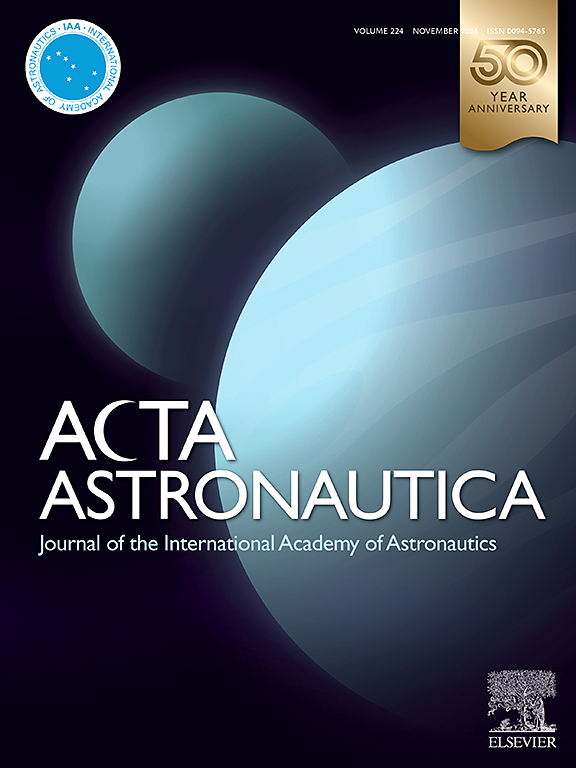带能量管理的可节流液体火箭发动机混合泵供油系统的方案设计与评估
IF 3.4
2区 物理与天体物理
Q1 ENGINEERING, AEROSPACE
引用次数: 0
摘要
目前,人们对液体发动机的电泵供能循环相当重视,这主要是由于其设计简单。然而,动力电池技术的不发达阻碍了它的发展。从电动汽车和涡轮增压器中使用的混合动力技术中汲取灵感,最初提出了一种用于可节流发动机的混合泵供油系统,作为一种有前途的解决方案。该系统将电动机集成到燃气发电机循环中,并对几种拓扑结构进行了评估。由于其结构紧凑、高效的功率分配和能量回收,我们选择了以中置电机为特色的并联配置。此外,还开发了定制的能源管理策略和优化模型,以便在液体发动机的整个运行过程中有效地分配动力。在典型的变推力任务下,对四种发动机循环进行了比较分析。结果表明,由于节约了涡轮气体和电池能量,优化后的混合动力泵的总质量比涡轮泵减少了 2.39%,比电动泵减少了 7.15%。适应性评估进一步表明,在发动机长时间燃烧和深度节流时,混合动力泵系统的质量优势更为显著。在特定的工作条件下,系统更倾向于使用电机驱动或涡轮能量再生。虽然能量回收会导致系统效率降低,但它可以降低电池组的能量需求,从而减轻电池热管理和结构设计的负担。这项研究为未来可变推力任务中的混合动力泵供能火箭发动机提供了一个实用的设计框架。本文章由计算机程序翻译,如有差异,请以英文原文为准。
Scheme design and assessment of hybrid pump feed system with energy management for throttleable liquid rocket engine
Currently, there is considerable emphasis on the electric pump-fed cycle for liquid engine, primarily due to its design simplicity. However, its development is hindered by the underdeveloped state of power battery technology. Drawing inspiration from hybrid power technology used in electric vehicles and turbochargers, a hybrid pump feed system for throttleable engines is originally proposed as a promising solution. This system integrates the electric motor into the gas generator cycle, with several topologies evaluated. The parallel configuration featuring a mid-motor is selected for its compact structure, efficient power-splitting and energy recovery. Additionally, customized energy management strategies and optimization models are developed to effectively allocate power throughout the operational processes of liquid engines. A comparative analysis of four engine cycles is conducted under the typically variable-thrust mission. The results indicate that attributed to the conservation of turbo-gas and battery energy, the optimized hybrid pump achieves a reduction of 2.39 % compared to the turbopump and 7.15 % to the electric pump in total mass. Adaptability assessment further indicates that the mass advantage of the hybrid pump system is more significant during prolonged engine burning and deep throttling. Specific working conditions are found in which the system prefers electric-motor driving or regenerating turbine energy. Although energy-recovery results in the system efficiency decrease, it serves to lower energy demand of battery pack, thus easing the burden on cell thermal management and structural design. This study provides a practical design framework for hybrid pump-fed rocket engines in future variable-thrust missions.
求助全文
通过发布文献求助,成功后即可免费获取论文全文。
去求助
来源期刊

Acta Astronautica
工程技术-工程:宇航
CiteScore
7.20
自引率
22.90%
发文量
599
审稿时长
53 days
期刊介绍:
Acta Astronautica is sponsored by the International Academy of Astronautics. Content is based on original contributions in all fields of basic, engineering, life and social space sciences and of space technology related to:
The peaceful scientific exploration of space,
Its exploitation for human welfare and progress,
Conception, design, development and operation of space-borne and Earth-based systems,
In addition to regular issues, the journal publishes selected proceedings of the annual International Astronautical Congress (IAC), transactions of the IAA and special issues on topics of current interest, such as microgravity, space station technology, geostationary orbits, and space economics. Other subject areas include satellite technology, space transportation and communications, space energy, power and propulsion, astrodynamics, extraterrestrial intelligence and Earth observations.
 求助内容:
求助内容: 应助结果提醒方式:
应助结果提醒方式:


